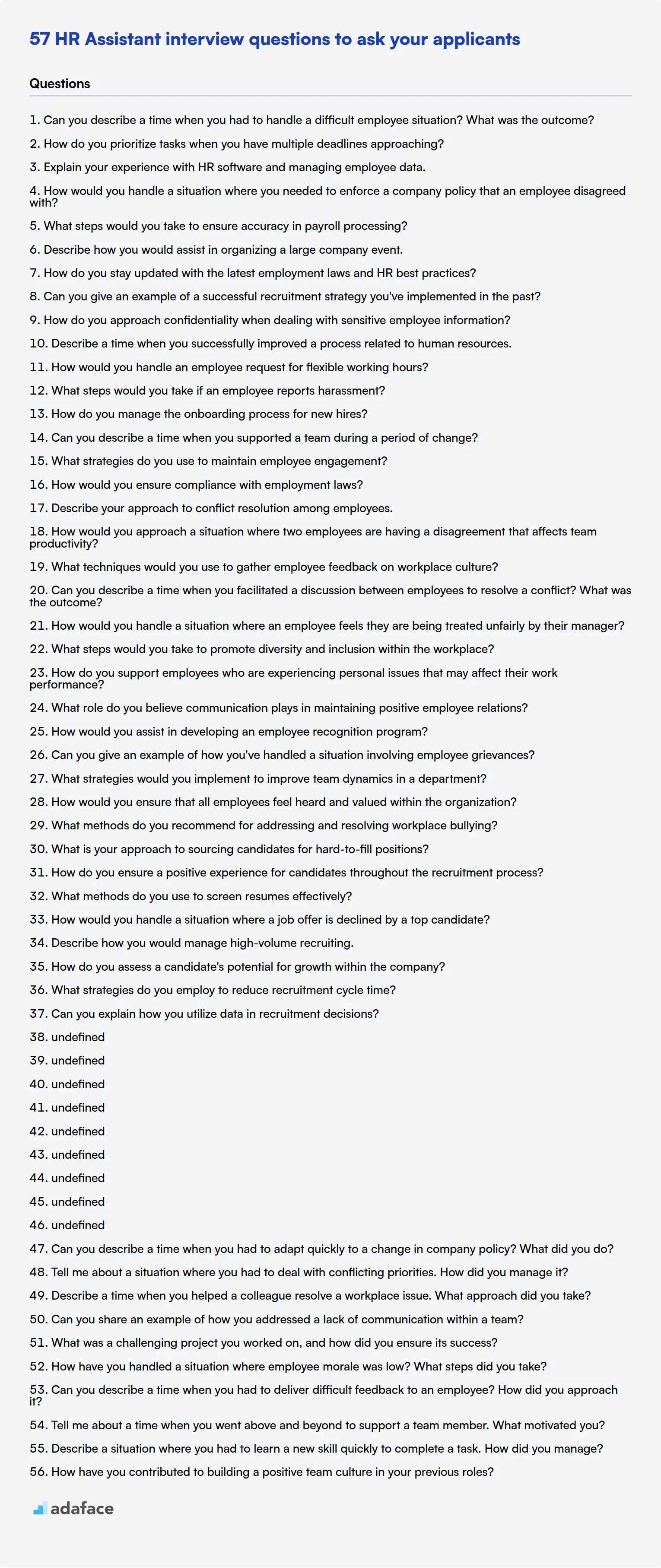Finding the right HR Assistant is crucial for maintaining a smooth-running human resources department. The HR Assistant role requires a unique blend of administrative skills, people skills, and an understanding of HR processes.
This blog post provides a comprehensive list of interview questions to help you evaluate HR Assistant candidates effectively. We've organized the questions into categories including common questions, junior-level assessments, employee relations, recruitment processes, situational scenarios, and behavioral inquiries.
By using these questions, you'll be better equipped to identify top talent for your HR team. Consider pairing these interview questions with pre-employment assessments to get a more holistic view of your candidates' capabilities.
Table of contents
10 common HR Assistant interview questions to ask your applicants
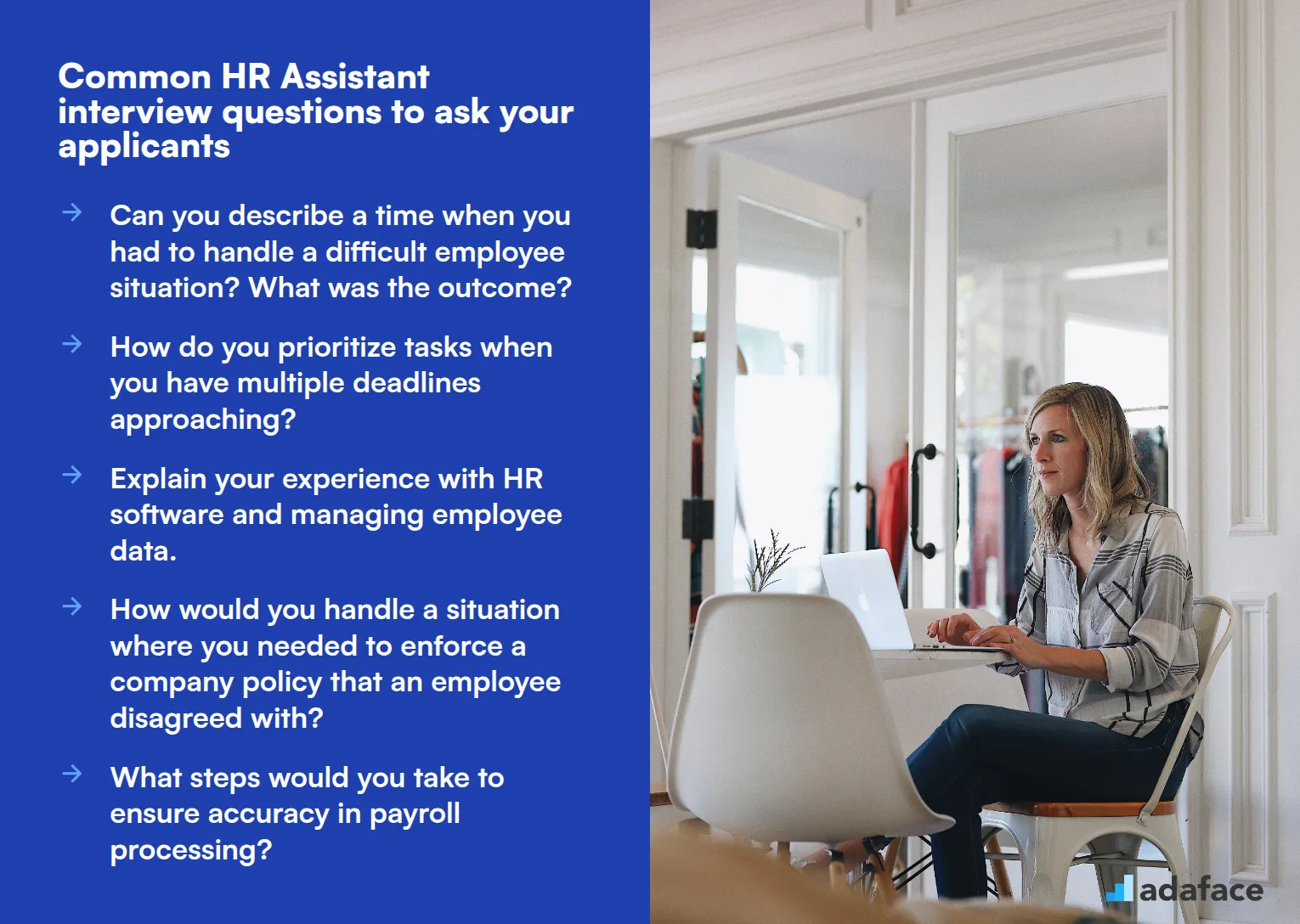
To find out if your candidates have what it takes to thrive as an HR Assistant, consider these essential interview questions. They are designed to evaluate key skills and competencies, helping you make informed hiring decisions.
- Can you describe a time when you had to handle a difficult employee situation? What was the outcome?
- How do you prioritize tasks when you have multiple deadlines approaching?
- Explain your experience with HR software and managing employee data.
- How would you handle a situation where you needed to enforce a company policy that an employee disagreed with?
- What steps would you take to ensure accuracy in payroll processing?
- Describe how you would assist in organizing a large company event.
- How do you stay updated with the latest employment laws and HR best practices?
- Can you give an example of a successful recruitment strategy you've implemented in the past?
- How do you approach confidentiality when dealing with sensitive employee information?
- Describe a time when you successfully improved a process related to human resources.
7 HR Assistant interview questions and answers to evaluate junior assistants
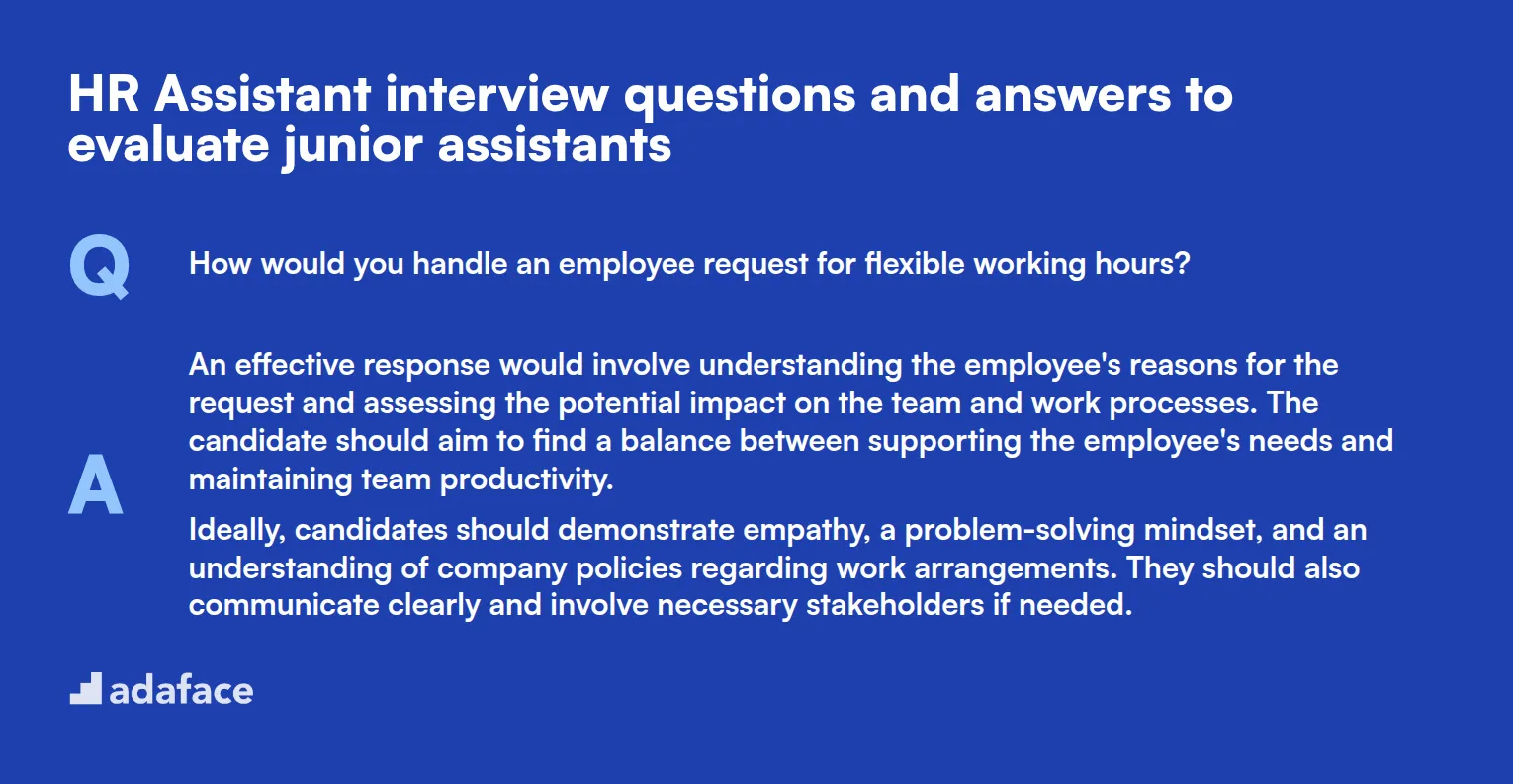
To ensure your junior HR assistants are ready to tackle the challenges of the role, these interview questions are designed to evaluate their skills and understanding effectively. Use this list during the interview process to identify candidates who can seamlessly integrate into your team and contribute positively from day one.
1. How would you handle an employee request for flexible working hours?
An effective response would involve understanding the employee's reasons for the request and assessing the potential impact on the team and work processes. The candidate should aim to find a balance between supporting the employee's needs and maintaining team productivity.
Ideally, candidates should demonstrate empathy, a problem-solving mindset, and an understanding of company policies regarding work arrangements. They should also communicate clearly and involve necessary stakeholders if needed.
2. What steps would you take if an employee reports harassment?
Addressing harassment requires prompt and confidential handling. The candidate should explain their process for documenting the complaint, investigating the matter thoroughly, and ensuring the well-being of the employee involved.
An ideal candidate will emphasize confidentiality, sensitivity, and adherence to company policies and legal requirements. They should also show awareness of the need for a supportive environment where employees feel safe to report issues.
3. How do you manage the onboarding process for new hires?
The onboarding process involves orienting new hires to the company culture, explaining job responsibilities, and setting them up for success with all necessary tools and information. Candidates should describe steps like preparing documentation, conducting orientation sessions, and introducing them to the team.
Candidates should highlight their organizational skills and attention to detail. Look for those who understand the importance of creating a welcoming and informative onboarding experience to ensure new hires feel integrated and supported from the start.
4. Can you describe a time when you supported a team during a period of change?
Candidates should share a specific example where they helped a team transition smoothly, whether it was a change in leadership, structure, or processes. They should explain their role, actions taken, and the outcomes.
A strong candidate will exhibit adaptability, initiative, and the ability to communicate effectively with team members. They should also demonstrate a proactive approach in anticipating challenges and providing support to ease the transition.
5. What strategies do you use to maintain employee engagement?
Maintaining employee engagement can involve organizing team-building activities, recognizing achievements, and providing opportunities for professional development. Candidates should discuss how they keep communication channels open and encourage feedback.
Look for candidates who show creativity and a commitment to fostering a positive work environment. They should understand how engagement impacts retention and productivity and have concrete strategies to keep morale high.
6. How would you ensure compliance with employment laws?
Ensuring compliance requires staying informed about local and federal employment regulations and implementing them in company policies. Candidates should mention regular training sessions, audits, and collaboration with legal teams as part of their strategy.
Candidates should exhibit strong attention to detail and a commitment to ethical practices. They should be proactive in identifying compliance gaps and addressing them promptly to mitigate risks.
7. Describe your approach to conflict resolution among employees.
An effective approach to conflict resolution involves listening to all parties involved, identifying the root cause, and facilitating a solution that respects everyone's perspectives. Candidates should describe how they remain neutral and guide discussions toward resolution.
The ideal candidate will show strong interpersonal skills, patience, and the ability to mediate effectively. They should also emphasize the importance of maintaining a positive work environment and preventing conflicts from escalating.
12 HR Assistant questions related to employee relations
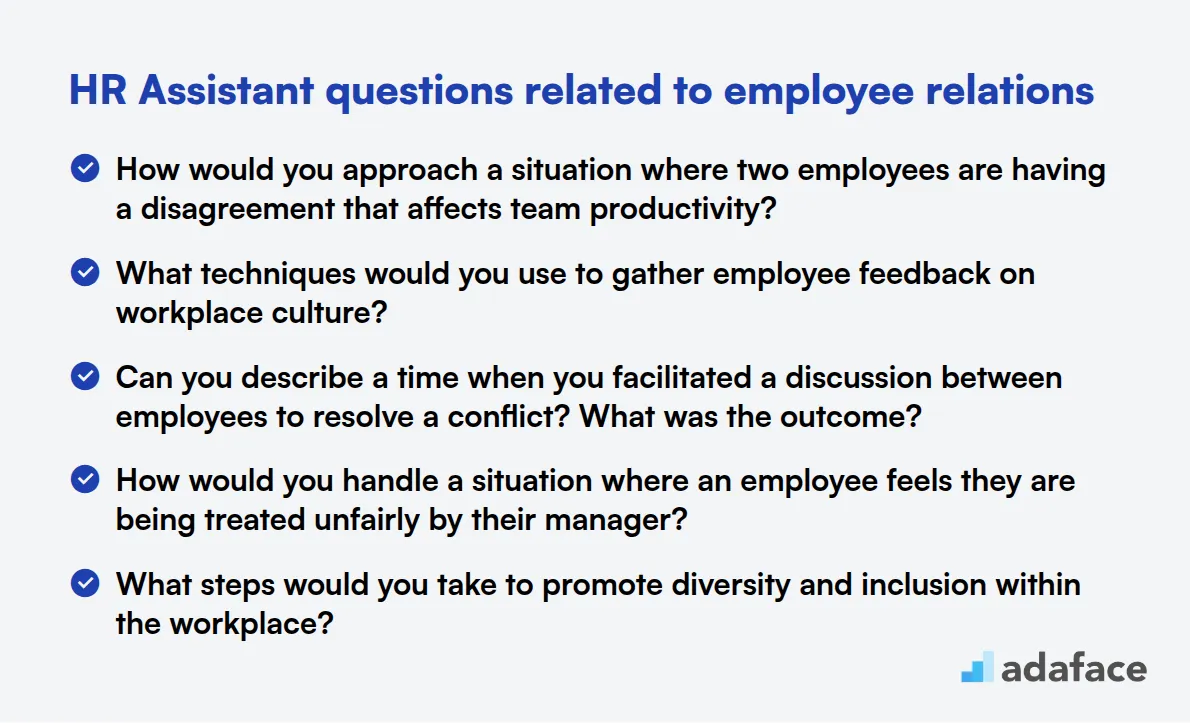
To effectively assess candidates' understanding of employee relations, use these targeted questions during the interview process. This list will help you gauge their ability to resolve conflicts and foster a positive workplace environment, which is crucial for any HR role. For more insights into HR roles, check out this HR Assistant job description.
- How would you approach a situation where two employees are having a disagreement that affects team productivity?
- What techniques would you use to gather employee feedback on workplace culture?
- Can you describe a time when you facilitated a discussion between employees to resolve a conflict? What was the outcome?
- How would you handle a situation where an employee feels they are being treated unfairly by their manager?
- What steps would you take to promote diversity and inclusion within the workplace?
- How do you support employees who are experiencing personal issues that may affect their work performance?
- What role do you believe communication plays in maintaining positive employee relations?
- How would you assist in developing an employee recognition program?
- Can you give an example of how you've handled a situation involving employee grievances?
- What strategies would you implement to improve team dynamics in a department?
- How would you ensure that all employees feel heard and valued within the organization?
- What methods do you recommend for addressing and resolving workplace bullying?
8 HR Assistant interview questions and answers related to recruitment processes
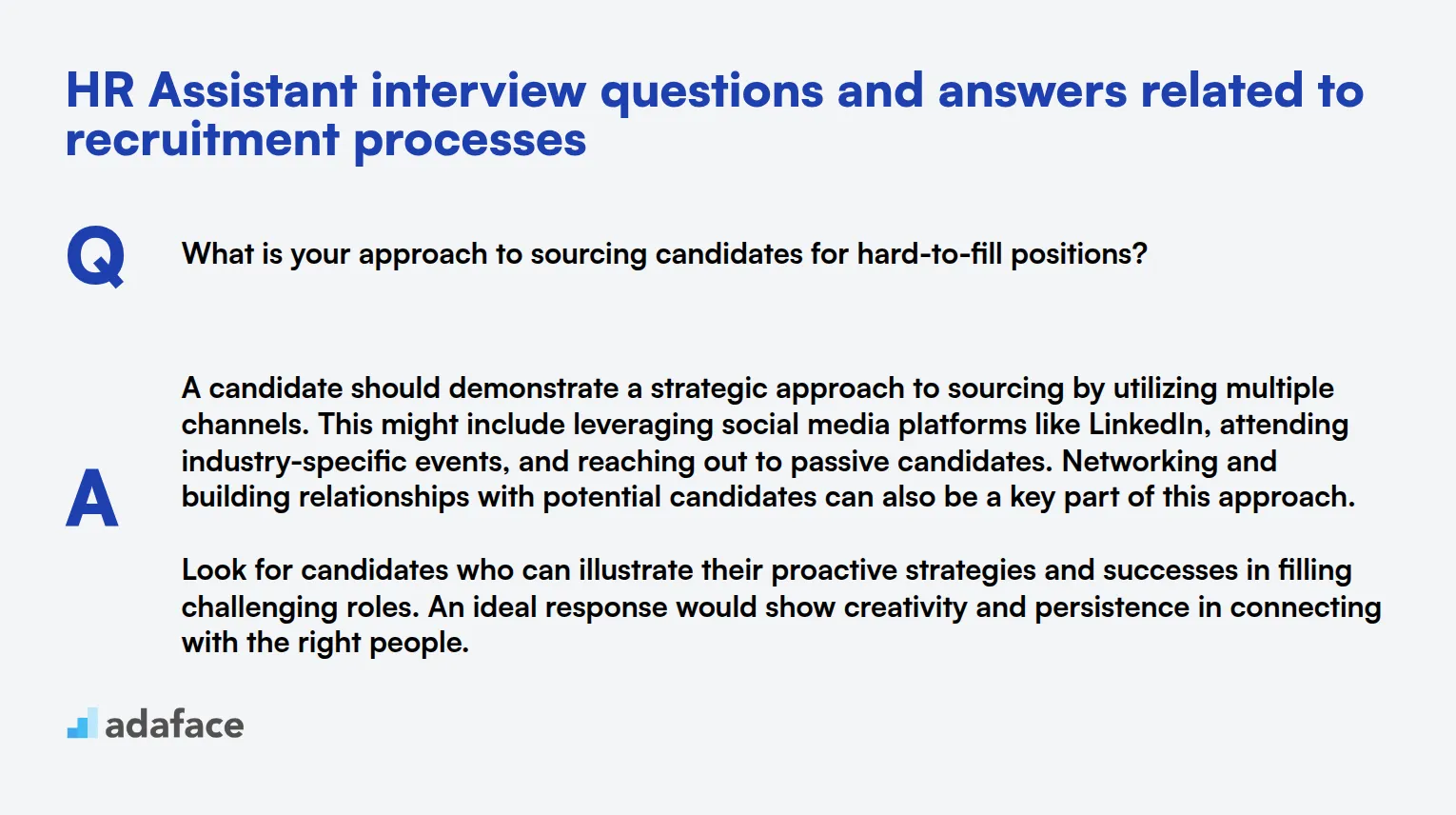
Unlock the secrets of a stellar recruitment process with these essential HR Assistant interview questions. Use this list to dig deep into your candidates' understanding of hiring dynamics and find the perfect fit for your team.
1. What is your approach to sourcing candidates for hard-to-fill positions?
A candidate should demonstrate a strategic approach to sourcing by utilizing multiple channels. This might include leveraging social media platforms like LinkedIn, attending industry-specific events, and reaching out to passive candidates. Networking and building relationships with potential candidates can also be a key part of this approach.
Look for candidates who can illustrate their proactive strategies and successes in filling challenging roles. An ideal response would show creativity and persistence in connecting with the right people.
2. How do you ensure a positive experience for candidates throughout the recruitment process?
Ensuring a positive candidate experience involves clear communication, timely feedback, and a respectful interview process. Candidates should mention personalized communication and making sure the interview process is smooth and transparent. They might also discuss the importance of following up and providing constructive feedback to all candidates, not just those who are successful.
An ideal candidate for the role would show empathy and understanding of the candidate's perspective, exhibiting a commitment to maintaining the company's employer brand.
3. What methods do you use to screen resumes effectively?
Effective resume screening involves identifying key skills, qualifications, and experience that match the job description. Candidates may mention using applicant tracking systems (ATS) to streamline the process, focusing on keywords related to the open position, and considering cultural fit.
Look for candidates who can articulate a clear, efficient process that balances technology and personal judgment, ensuring that top candidates are not overlooked due to overly rigid screening criteria.
4. How would you handle a situation where a job offer is declined by a top candidate?
When a job offer is declined, it’s important to understand the candidate's reasons. Candidates should mention how they would reach out to the candidate to gather feedback, assess if there's room to negotiate or present alternative options, and then evaluate the recruitment process to identify potential improvements.
An ideal response would show problem-solving skills and a proactive approach to learning from the situation to enhance future recruitment efforts.
5. Describe how you would manage high-volume recruiting.
High-volume recruiting requires efficient processes and tools. Candidates should talk about organizing recruitment drives, leveraging technology such as ATS for automation, and setting clear timelines. They might also mention coordinating with hiring managers to prioritize roles and ensuring the recruitment team is aligned and equipped to handle the volume.
Look for candidates who demonstrate strong organizational skills and the ability to maintain quality standards even under pressure.
6. How do you assess a candidate's potential for growth within the company?
Assessing potential for growth involves evaluating a candidate's skills, attitude, and cultural fit. Candidates might mention looking for indicators of adaptability, learning agility, and ambition in their past roles. They may also discuss conducting behavior-based interviews to identify potential for development.
An ideal candidate should exhibit insight into how to match candidates with long-term organizational needs and culture.
7. What strategies do you employ to reduce recruitment cycle time?
Reducing recruitment cycle time can involve streamlining the interview process, leveraging technology for scheduling and communication, and maintaining a robust talent pipeline. Candidates may also discuss collaborating closely with hiring managers to ensure clarity and efficiency in each stage of recruitment.
Look for candidates who show initiative and innovation in optimizing processes without sacrificing candidate quality.
8. Can you explain how you utilize data in recruitment decisions?
Data-driven recruitment involves analyzing metrics such as time-to-hire, source of hire, and candidate quality. Candidates should mention how they use these data points to identify patterns, improve sourcing strategies, and enhance the overall recruitment process. They might also discuss using data to predict trends and align recruitment efforts with the organization's strategic goals.
An ideal candidate will demonstrate an ability to interpret data insights effectively to make informed recruitment decisions, perhaps referencing tools or systems they have used.
9 situational HR Assistant interview questions with answers for hiring top assistants
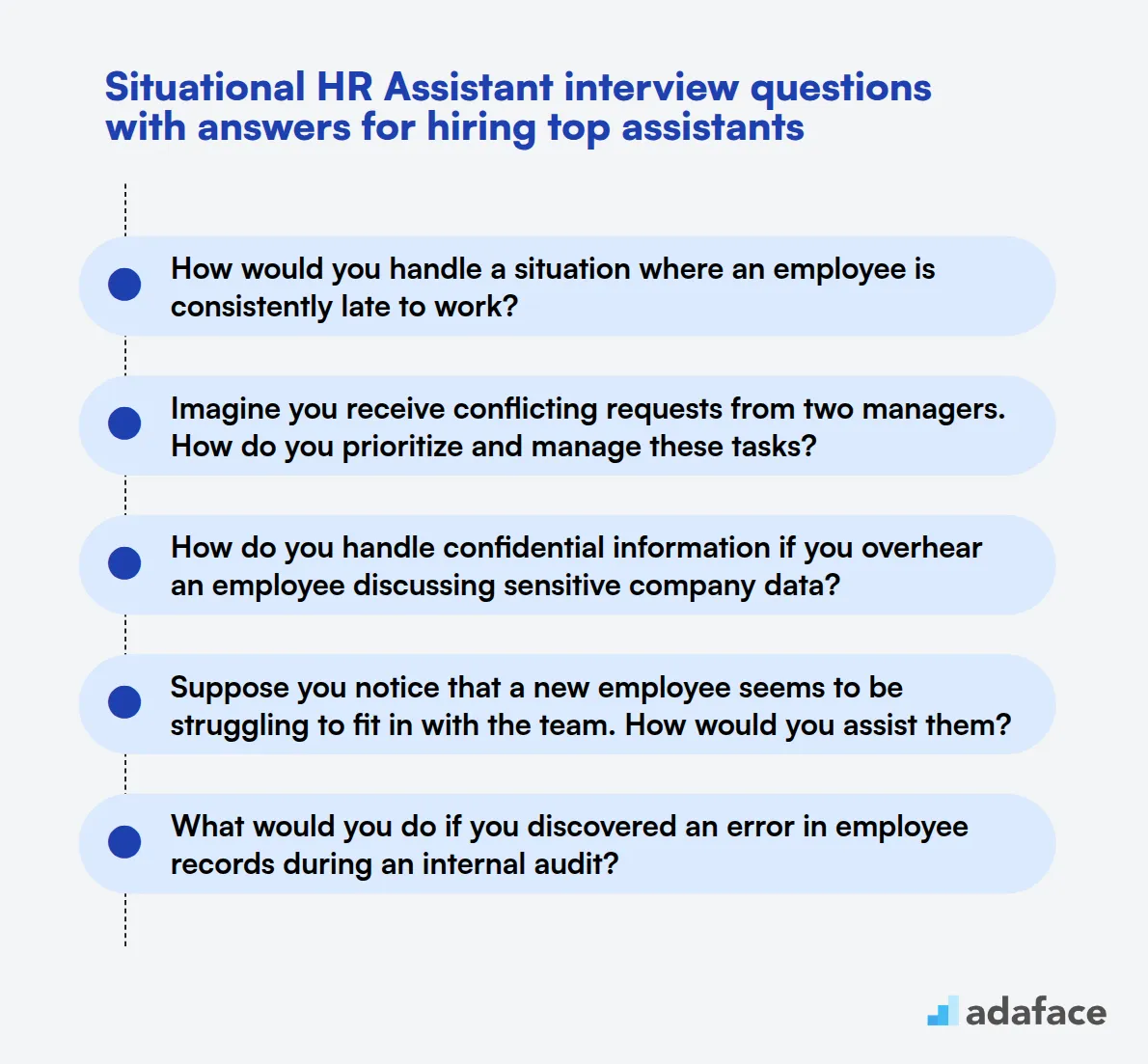
Navigating the interview process can be a bit like trying to solve a jigsaw puzzle. To ensure you find the perfect fit for your HR Assistant role, use these situational interview questions. They’ll help you see how candidates think on their feet and handle real-world HR scenarios with finesse.
1. How would you handle a situation where an employee is consistently late to work?
Addressing punctuality issues requires a balance of understanding and firmness. Initially, I would have a private conversation with the employee to understand if there are any underlying issues causing the tardiness, such as personal challenges or transportation problems.
After understanding their situation, I would work with the employee to develop a plan for improvement, which might include adjusting their start time if necessary or providing resources for better time management.
What to look for: The candidate should demonstrate empathy and problem-solving skills. They should also show an ability to uphold company policies while considering individual circumstances.
2. Imagine you receive conflicting requests from two managers. How do you prioritize and manage these tasks?
In such scenarios, I would prioritize tasks based on urgency and importance. I would communicate with both managers to understand the deadlines and the impact of each task on the company’s goals.
If both tasks are equally critical, I would seek guidance from a higher authority or propose a compromise solution that aligns with the company’s priorities.
What to look for: Look for candidates who can demonstrate clear communication skills, effective time management, and the ability to make decisions under pressure.
3. How do you handle confidential information if you overhear an employee discussing sensitive company data?
Protecting confidential information is crucial in HR. If I overhear such a discussion, I would first ensure that the conversation is not taking place in a public setting. Then, I would remind the employee about the importance of confidentiality and the policies in place to protect sensitive data.
I would document the incident and, if necessary, escalate it to the HR manager for further action, ensuring the matter is handled discreetly and professionally.
What to look for: The candidate should show an understanding of confidentiality protocols and demonstrate assertiveness in enforcing company policies.
4. Suppose you notice that a new employee seems to be struggling to fit in with the team. How would you assist them?
Helping new employees integrate is key to their success. I would first have an informal chat with the employee to understand their concerns and any specific challenges they are facing.
Based on their feedback, I might facilitate introductions to other team members, arrange for a mentor, or suggest team-building activities to help them feel more welcome.
What to look for: Look for empathy, proactive problem-solving, and the ability to foster a supportive work environment in the candidate’s response.
5. What would you do if you discovered an error in employee records during an internal audit?
Accuracy in employee records is critical. Upon discovering an error, I would first verify the mistake and gather all relevant information about how it occurred.
Next, I would correct the error following the company's protocols and ensure the employee involved is notified if it affects them. I would also review the process to prevent future occurrences.
What to look for: Candidates should exhibit attention to detail and a methodical approach to correcting errors and preventing future issues.
6. How would you manage your workload if you suddenly find yourself with an unexpected increase in administrative tasks?
Managing an increased workload efficiently requires prioritization and organization. I would first list all tasks and deadlines, categorizing them by urgency and importance.
I might also consider delegating tasks, if appropriate, or seek temporary support from colleagues. Communicating my situation to my manager could also lead to a temporary redistribution of tasks.
What to look for: Look for candidates who can demonstrate strong organizational skills, adaptability, and effective communication.
7. Imagine a team member approaches you with a complaint about their workload. How would you address this?
Addressing workload complaints begins with listening. I would first listen to the team member’s concerns to fully understand the scope of the issue.
Afterwards, I would explore potential solutions, such as redistributing tasks within the team or discussing possible adjustments with their manager to balance the workload.
What to look for: Candidates should show empathy, active listening skills, and a collaborative approach to resolving workplace issues.
8. How would you address a situation where an employee is not following company dress code policies?
Addressing dress code violations requires a respectful and clear approach. I would have a private conversation with the employee to discuss the dress code requirements and understand if there are any personal reasons for their non-compliance.
I would offer suggestions to help them adhere to the policy and remind them of the importance of presenting a professional image while representing the company.
What to look for: Candidates should demonstrate effective communication skills and the ability to enforce company policies tactfully.
9. Suppose an employee raises a concern about career advancement opportunities. How would you assist them?
Supporting employees in their career growth is essential. I would start by discussing their career goals and current performance to identify potential paths for advancement within the company.
I might suggest relevant training, mentorship opportunities, or discuss potential roles and projects that align with their aspirations.
What to look for: Look for candidates who advocate for employee development and can provide practical advice and resources to support career growth.
11 behavioral HR Assistant interview questions
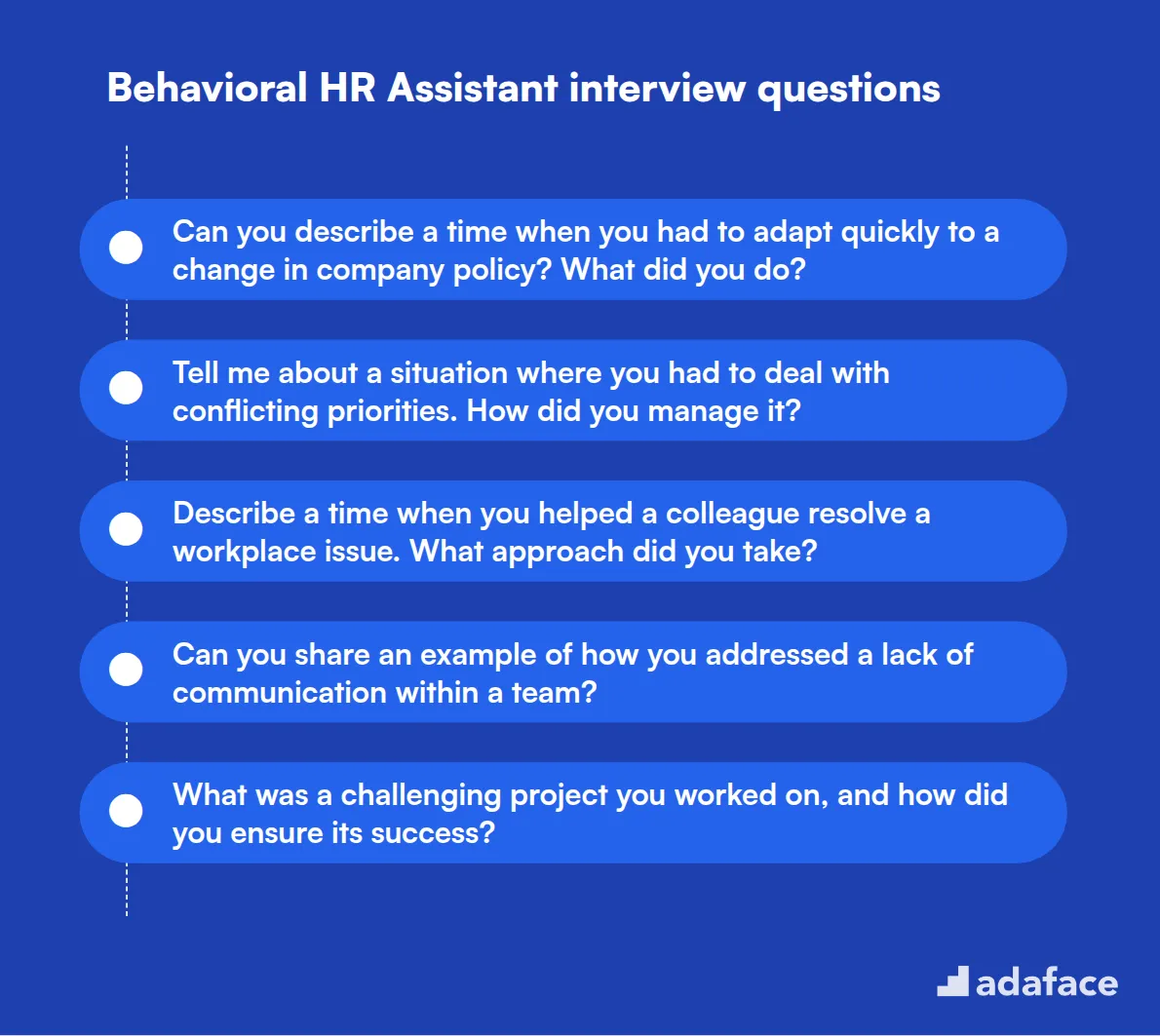
To find the right HR Assistant, it's essential to ask questions that reveal how candidates respond to various situations. Use this list of behavioral interview questions to assess their past experiences and ensure they align with your organization's needs. You can also refer to the HR Assistant job description for more context.
- Can you describe a time when you had to adapt quickly to a change in company policy? What did you do?
- Tell me about a situation where you had to deal with conflicting priorities. How did you manage it?
- Describe a time when you helped a colleague resolve a workplace issue. What approach did you take?
- Can you share an example of how you addressed a lack of communication within a team?
- What was a challenging project you worked on, and how did you ensure its success?
- How have you handled a situation where employee morale was low? What steps did you take?
- Can you describe a time when you had to deliver difficult feedback to an employee? How did you approach it?
- Tell me about a time when you went above and beyond to support a team member. What motivated you?
- Describe a situation where you had to learn a new skill quickly to complete a task. How did you manage?
- How have you contributed to building a positive team culture in your previous roles?
Which HR Assistant skills should you evaluate during the interview phase?
While it's challenging to assess every aspect of a candidate in a single interview, focusing on core HR Assistant skills is essential. Here are the key abilities to evaluate during the interview process:
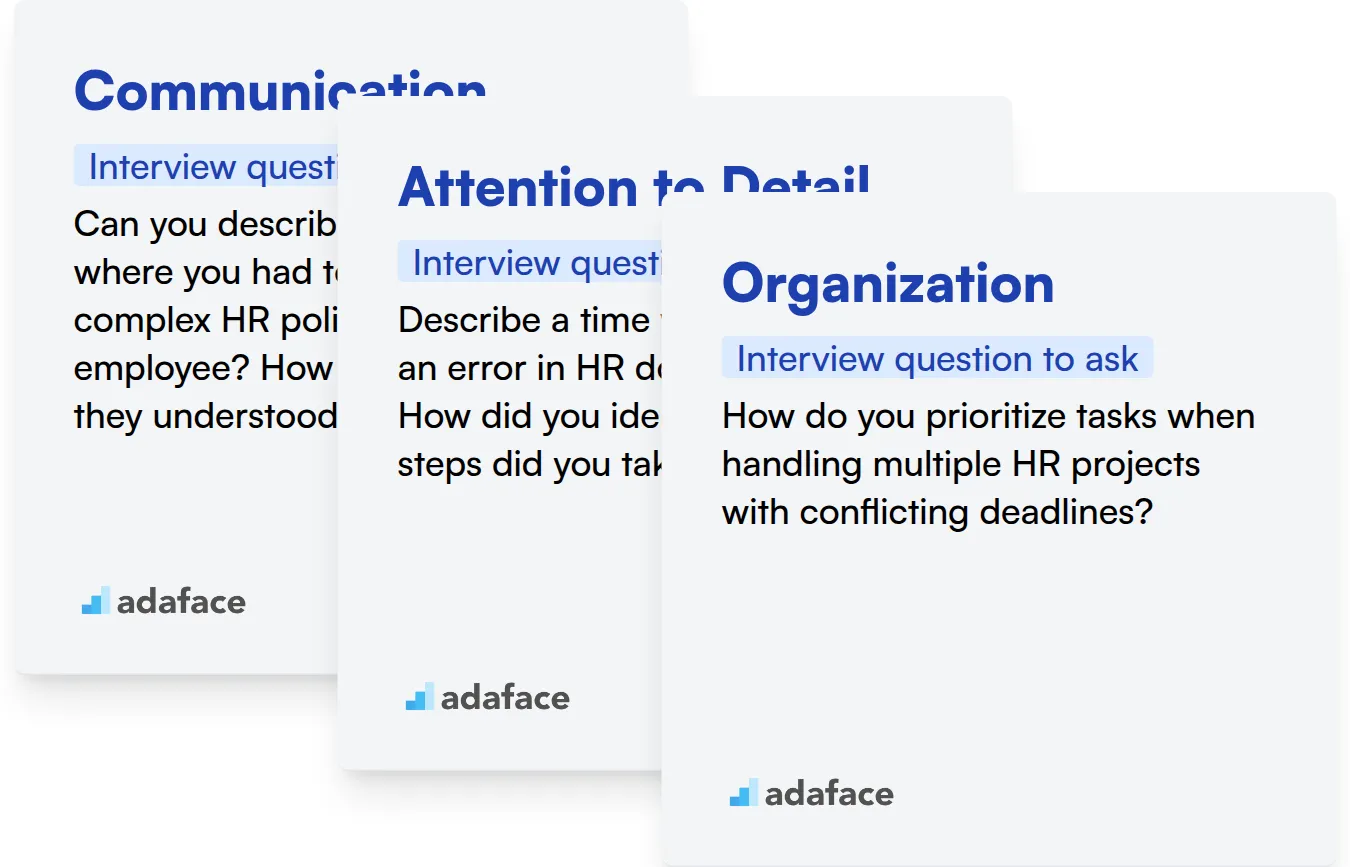
Communication
Effective communication is vital for HR Assistants. They need to interact with employees, management, and external parties clearly and professionally.
Consider using a communication test with relevant MCQs to evaluate this skill. This can help filter candidates based on their communication abilities.
To assess communication skills during the interview, you can ask targeted questions. Here's an example:
Can you describe a situation where you had to explain a complex HR policy to an employee? How did you ensure they understood?
Look for candidates who demonstrate clarity in their explanation, use of simple language, and methods to confirm understanding. Strong communicators will also mention adapting their style to the listener.
Attention to Detail
HR Assistants handle sensitive information and need to maintain accurate records. Attention to detail is crucial to avoid errors in documentation and data entry.
An attention to detail test can be useful to evaluate this skill. It can help identify candidates who are meticulous and thorough in their work.
During the interview, you can assess attention to detail with a question like:
Describe a time when you caught an error in HR documentation. How did you identify it, and what steps did you take to correct it?
Look for candidates who demonstrate a systematic approach to reviewing documents, ability to spot discrepancies, and initiative in correcting errors. They should also mention steps to prevent similar mistakes in the future.
Organization
Organizational skills are key for HR Assistants to manage multiple tasks, maintain files, and coordinate HR activities efficiently.
To evaluate organizational skills, consider asking:
How do you prioritize tasks when handling multiple HR projects with conflicting deadlines?
Strong candidates will describe specific techniques they use to manage time and tasks, such as creating to-do lists, using project management tools, or setting reminders. They should also mention how they communicate with stakeholders about priorities and deadlines.
3 Tips for Using HR Assistant Interview Questions
Before you start applying what you've learned, here are some tips to enhance your interview process. These suggestions are designed to help you make informed decisions and find the best candidates.
1. Incorporate Skill Tests Before Interviews
Skill tests can be an invaluable tool in the recruitment process. They provide a clear indication of a candidate's abilities, ensuring that only the most qualified individuals advance to the interview stage.
Consider using tests from our library to assess relevant skills. For example, the HR Test can evaluate core HR competencies, while the Communication Test measures how effectively candidates can interact with others.
By implementing these tests, you ensure that candidates not only have theoretical knowledge but can also apply their skills in practical situations. With this foundation, let's move on to the next tip.
2. Compile Focused Interview Questions
Time is limited in interviews, so it's important to select the most impactful questions. Focus on questions that evaluate key skills and traits relevant to the HR Assistant role.
You can also consider incorporating questions from related domains. For instance, questions on communication or attention to detail are beneficial.
3. Ask Follow-Up Questions to Dive Deeper
Simply asking interview questions isn't enough; follow-up questions can reveal a candidate's true depth of understanding. They help you determine if candidates are authentic and capable.
For example, if asking about a time they resolved a conflict at work, follow up with, 'What did you learn from that experience?' This helps assess their growth mindset and ability to apply lessons learned in future situations.
Utilize HR Skills Tests and Interview Questions to Hire Effective HR Assistants
If you're looking to hire someone with strong HR skills, it's important to ensure that candidates possess these abilities accurately. One of the best ways to achieve this is by using skill-specific tests. Consider using our HR Test or Talent Acquisition Test to evaluate candidates effectively.
Once you've used the tests to shortlist the best applicants, you can invite them for interviews with confidence. To streamline this next step, sign up for our platform here or explore more on our online assessment platform.
HR Test
Download HR Assistant interview questions template in multiple formats
HR Assistant Interview Questions FAQs
An HR Assistant should have strong organizational skills, attention to detail, communication abilities, knowledge of HR processes, and proficiency in HRIS software.
Use situational and behavioral questions that present realistic HR scenarios and ask candidates to explain how they would approach and resolve these issues.
The required experience depends on your needs, but typically 1-3 years in HR or a related field is suitable for an assistant role.
Ask specific questions about common employment laws and regulations, and present scenarios where legal knowledge would be applied in day-to-day HR tasks.
Look for familiarity with HRIS systems, applicant tracking software, and Microsoft Office suite, especially Excel for data management and reporting.

40 min skill tests.
No trick questions.
Accurate shortlisting.
We make it easy for you to find the best candidates in your pipeline with a 40 min skills test.
Try for freeRelated posts
Free resources




